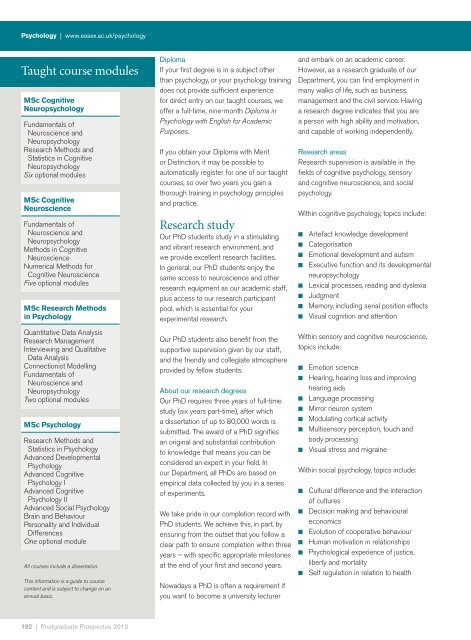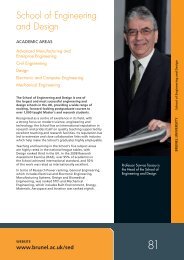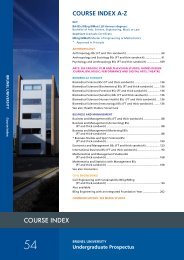Postgraduate Prospectus
Postgraduate Prospectus
Postgraduate Prospectus
You also want an ePaper? Increase the reach of your titles
YUMPU automatically turns print PDFs into web optimized ePapers that Google loves.
Psychology | www.essex.ac.uk/psychology<br />
Taught course modules<br />
MSc Cognitive<br />
Neuropsychology<br />
Fundamentals of<br />
Neuroscience and<br />
Neuropsychology<br />
Research Methods and<br />
Statistics in Cognitive<br />
Neuropsychology<br />
Six optional modules<br />
MSc Cognitive<br />
Neuroscience<br />
Fundamentals of<br />
Neuroscience and<br />
Neuropsychology<br />
Methods in Cognitive<br />
Neuroscience<br />
Numerical Methods for<br />
Cognitive Neuroscience<br />
Five optional modules<br />
MSc Research Methods<br />
in Psychology<br />
Quantitative Data Analysis<br />
Research Management<br />
Interviewing and Qualitative<br />
Data Analysis<br />
Connectionist Modelling<br />
Fundamentals of<br />
Neuroscience and<br />
Neuropsychology<br />
Two optional modules<br />
MSc Psychology<br />
Research Methods and<br />
Statistics in Psychology<br />
Advanced Developmental<br />
Psychology<br />
Advanced Cognitive<br />
Psychology I<br />
Advanced Cognitive<br />
Psychology II<br />
Advanced Social Psychology<br />
Brain and Behaviour<br />
Personality and Individual<br />
Differences<br />
One optional module<br />
All courses include a dissertation.<br />
This information is a guide to course<br />
content and is subject to change on an<br />
annual basis.<br />
Diploma<br />
If your first degree is in a subject other<br />
than psychology, or your psychology training<br />
does not provide sufficient experience<br />
for direct entry on our taught courses, we<br />
offer a full-time, nine-month Diploma in<br />
Psychology with English for Academic<br />
Purposes.<br />
If you obtain your Diploma with Merit<br />
or Distinction, it may be possible to<br />
automatically register for one of our taught<br />
courses, so over two years you gain a<br />
thorough training in psychology principles<br />
and practice.<br />
Research study<br />
Our PhD students study in a stimulating<br />
and vibrant research environment, and<br />
we provide excellent research facilities.<br />
In general, our PhD students enjoy the<br />
same access to neuroscience and other<br />
research equipment as our academic staff,<br />
plus access to our research participant<br />
pool, which is essential for your<br />
experimental research.<br />
Our PhD students also benefit from the<br />
supportive supervision given by our staff,<br />
and the friendly and collegiate atmosphere<br />
provided by fellow students.<br />
About our research degrees<br />
Our PhD requires three years of full-time<br />
study (six years part-time), after which<br />
a dissertation of up to 80,000 words is<br />
submitted. The award of a PhD signifies<br />
an original and substantial contribution<br />
to knowledge that means you can be<br />
considered an expert in your field. In<br />
our Department, all PhDs are based on<br />
empirical data collected by you in a series<br />
of experiments.<br />
We take pride in our completion record with<br />
PhD students. We achieve this, in part, by<br />
ensuring from the outset that you follow a<br />
clear path to ensure completion within three<br />
years – with specific appropriate milestones<br />
at the end of your first and second years.<br />
Nowadays a PhD is often a requirement if<br />
you want to become a university lecturer<br />
and embark on an academic career.<br />
However, as a research graduate of our<br />
Department, you can find employment in<br />
many walks of life, such as business,<br />
management and the civil service. Having<br />
a research degree indicates that you are<br />
a person with high ability and motivation,<br />
and capable of working independently.<br />
Research areas<br />
Research supervision is available in the<br />
fields of cognitive psychology, sensory<br />
and cognitive neuroscience, and social<br />
psychology.<br />
Within cognitive psychology, topics include:<br />
n Artefact knowledge development<br />
n Categorisation<br />
n Emotional development and autism<br />
n Executive function and its developmental<br />
neuropsychology<br />
n Lexical processes, reading and dyslexia<br />
n Judgment<br />
n Memory, including serial position effects<br />
n Visual cognition and attention<br />
Within sensory and cognitive neuroscience,<br />
topics include:<br />
n Emotion science<br />
n Hearing, hearing loss and improving<br />
hearing aids<br />
n Language processing<br />
n Mirror neuron system<br />
n Modulating cortical activity<br />
n Multisensory perception, touch and<br />
body processing<br />
n Visual stress and migraine<br />
Within social psychology, topics include:<br />
n Cultural difference and the interaction<br />
of cultures<br />
n Decision making and behavioural<br />
economics<br />
n Evolution of cooperative behaviour<br />
n Human motivation in relationships<br />
n Psychological experience of justice,<br />
liberty and mortality<br />
n Self regulation in relation to health<br />
192 | <strong>Postgraduate</strong> <strong>Prospectus</strong> 2012

















